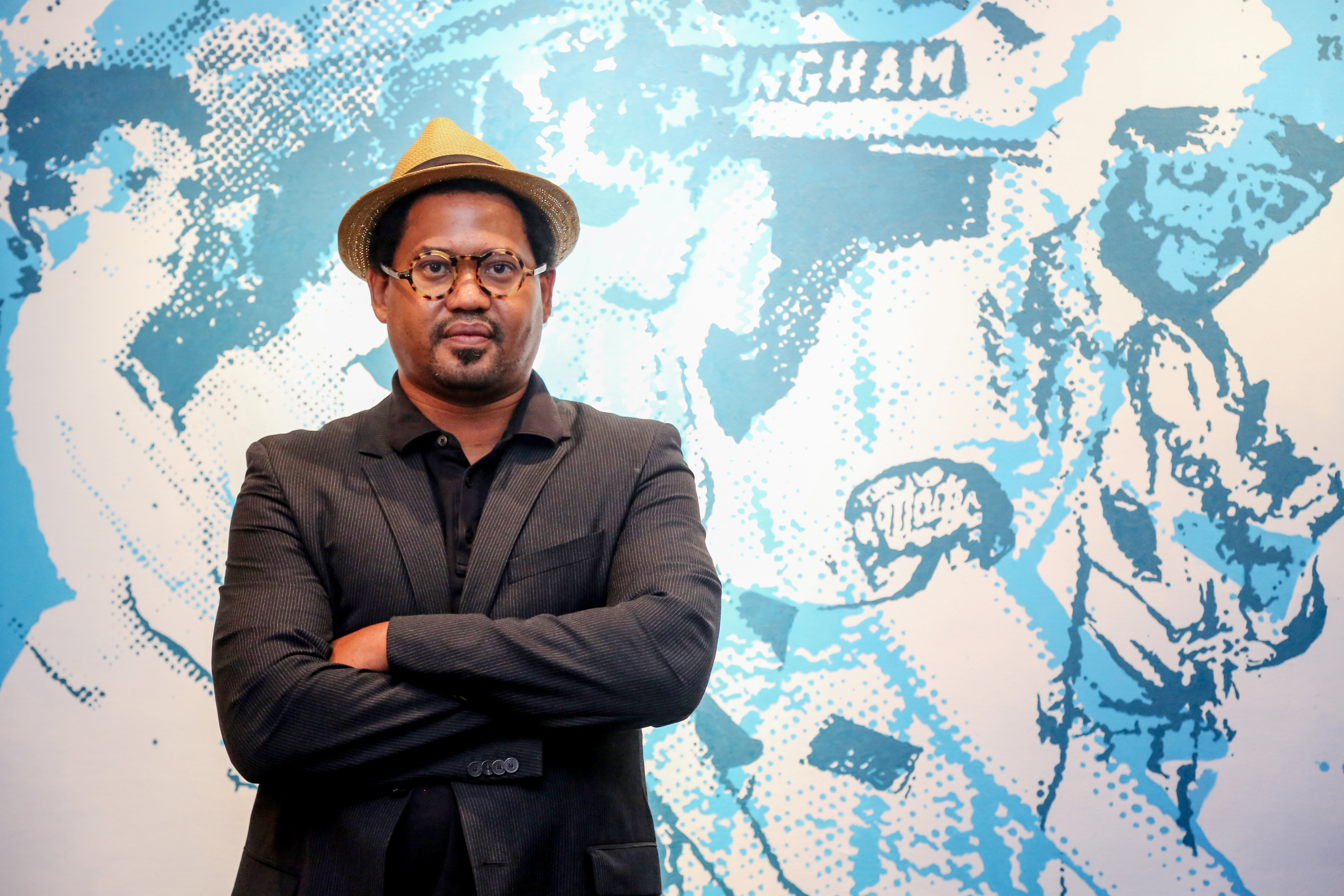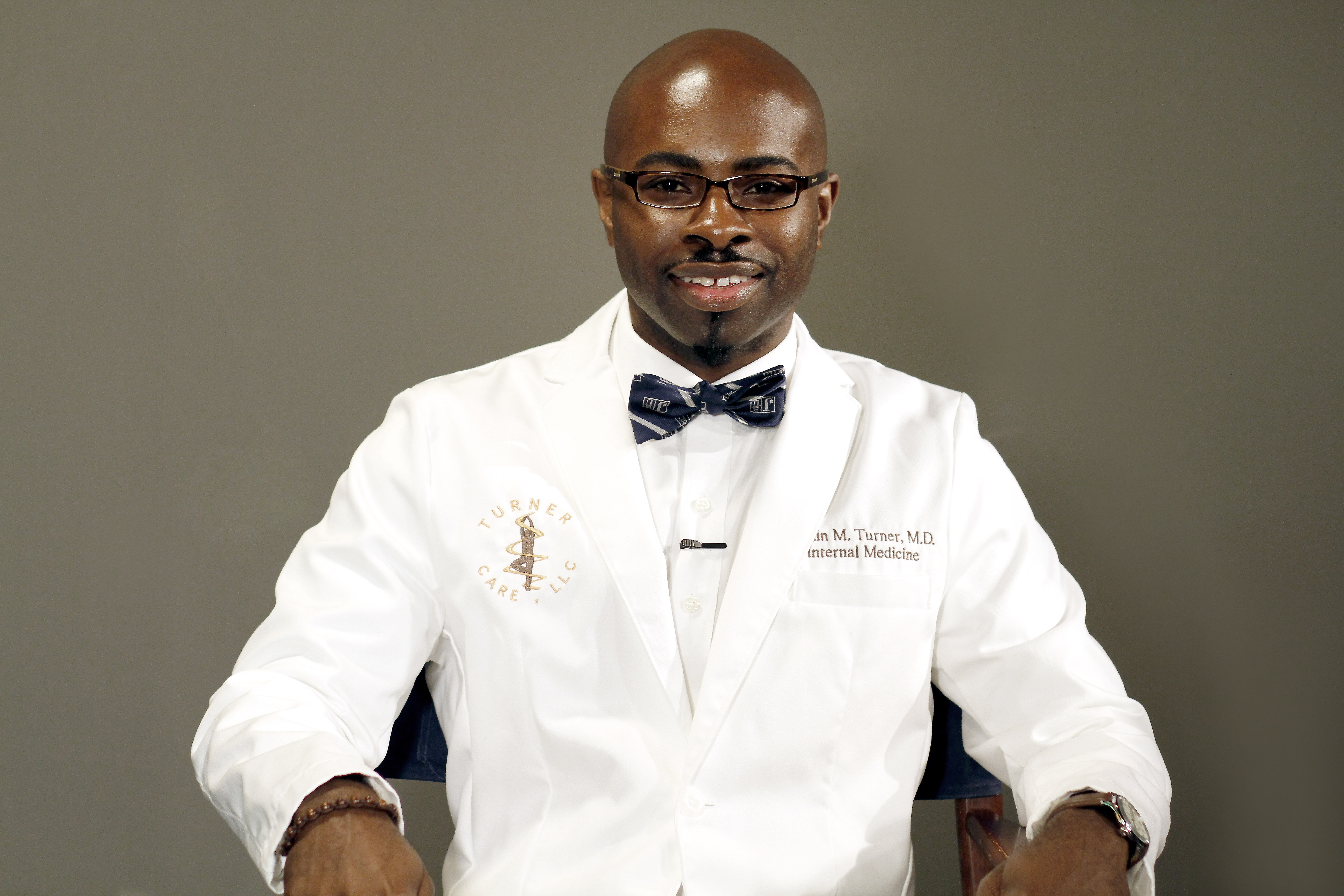By L.A. Warren
The 16-year-old already was struggling to raise his younger siblings because his mother was strung out on drugs, but then things got more complicated when a 20-minute rapid test revealed he was HIV-positive. Christopher Lane, now a Jackson State University employee and doctoral student, was the teenager’s mentor as part of a nonprofit program in Washington, D.C. years ago. “It didn’t go well for him. I was trying to maintain myself for him because he couldn’t see what his life would amount to.”
Because of Lane’s intervention, however, the teen was paired with a health advocate and clinical social worker who made sure he kept his appointments and understood his lab results. Eventually, the teen earned his master’s degree in public health. Now working for a health agency in the D.C. area, the young man advises others about abstinence and safe-sex practices, said Lane, a compliance manager in the Office of Research and Economic Development for JSU’s Institutional Review Board. Similar life-changing work is in play at the recently accredited Mississippi School of Public Health at JSU – the only such accredited school in Mississippi and one of 65 in the nation.
SPH is using its new status to curb disproportionate HIV infections in the Magnolia state, which, in 2015, had the sixth-highest rate of diagnoses in the nation. During that same time period, Jackson had the single-highest transmissions of all metropolitan areas in the U.S. It is also targeting other diseases and disorders to extend life expectancy in economically depressed areas.
President William B. Bynum Jr. expressed a sense of accomplishment over JSU’s accreditation. He commended the HBCU for continuously shaping lives globally and, particularly, in Mississippi, where the mortality rate for cardiovascular disease remains the highest in the nation and concerns about obesity weigh heavily.
“This is a remarkable accomplishment for Jackson State, the state of Mississippi and beyond,” Bynum said. “Our goals are to continue to make impactful advances for our state and nation in the field of public health and increase life expectancy and the public’s well-being.”
Dr. Lynda Brown-Wright, provost and vice president for Academic Affairs, described JSU’s accomplishment as a watershed moment.
“The faculty in the School of Public Health were among the original architects of the Jackson Heart Study,” Brown-Wright said. “Through this accreditation, Jackson State continues to show significant leadership in demonstrating the importance of HBCUs, and I anticipate that the School of Public Health will continue its vision in advancing research and the delivery of quality health care in Mississippi and the region.”
Dr. Mohammad Shahbazi, interim dean of SPH, defines public health as “an organized effort among public and private sectors to improve health.” He admits that “some people mistakenly think public health is just for poor people when actually it promotes good health and prevents diseases within the entire population.” Shahbazi said the field branches out to include other elements – clean air and water, and nutritious foods.
Dr. Bill Cissell, executive assistant to the dean and director of assessment and accreditation, said medicine has a very dominant role in treating people after they become sick or injured. “Public health works systematically to help people achieve optimal health before they get sick,” he said.
Cissell said this means, for example, “providing immunization to prevent infections to begin with and teaching people how to improve or maintain optimal health through fitness, eating well and avoiding sexually transmitted infections.” Shahbazi said that nearly 80 percent of people’s health outcome isn’t genetic but results from social determinants of health. These include birthplace, food consumption, socio-economics, educational level and sufficient income — especially for purchasing good health insurance.
He notes that studies even show different outcomes for identical twins placed in separate environments. In 2014, SPH illustrated the importance of public health when it studied areas of Jackson and the Mississippi Delta. It trained community health workers to help residents in Belzoni and Georgetown. Many people living in these areas have limited income and less access to doctors than wealthier people.
The certified community workers filled a much-needed gap and lived in the areas where they served. They performed basic care, made house calls and provided low-cost preventive services in rural, desolate, marginalized areas. They also made sure patients followed up with their appointments and reported health hazards such as mold in residents’ homes. While the concept of community health workers isn’t new, results remain positive. For example, JSU assigned the trained workers to care for high-cost patients insured by United Healthcare for two years, and $7,500 was saved annually per patient.
“We let the community know that they don’t have to visit the ER for non-emergency reasons,” Shahbazi said. “They can actually go to a clinic to get their medication.”
A big reason for the success is that neighbors trusted these trained residents because “care-givers have similar social experiences and cultural competencies as the patients they serve,” Shahbazi said.
One of those community health workers was Tenisha Mims, 39, of Belzoni. She’s a single mother of five boys (ages 17, 14, 9, and twin 6-year-olds). She also assists her mother, who suffers from Alzheimer’s. Mims attended college but dropped out due to family obligations, but her passion for helping others is remarkable.
“I’m a person who loves to assist regardless of age or race.” Her family experiences allowed her to relate to single parents in her community who lacked help or money for transportation or gas to make an appointment.

Mims aided clients in Holmes and Humphreys counties. She recounts assisting a mother with a disobedient child. Through her counsel, the situation improved over time between mother and son. The family also curbed its frequent ER visits for issues such as minor headaches. She also secured a wheelchair for a different family whose child was unable to walk. Mims hopes the program will be revived. “Community health workers are important because a lot of people and families are not educated about home care.”
For all the good SPH does, there is some concern about funding because the $500 million Ayers settlement shared among all three of Mississippi’s state-supported HBCUs will dry up in 2022. It takes about $3 million to operate SPH, which has relied on Ayers for 100 percent of its operating expenses. Last year’s Ayers stepdown reduced SPH’s budget by $1.5 million. This meant no money for travel and other general expenses.
Fortunately, the Mississippi Legislature softened the blow by awarding SPH $1.8 million last year. Enrollment dollars and grant money should be able to fill the future gap, Shahbazi said. Also, all faculty members funded previously by Ayers have been moved to educational and general funds, with JSU expected to include SPH in its next budget.
SPH has five disciplines: health policy and management; epidemiology; biostatistics, health promotion and education; and environmental health. Those accredited disciplines are within three departments:
- Department of Health Policy and Management (master’s and doctoral levels; it also has a health care administration undergraduate program);
- Department of Epidemiology and Biostatistics (master’s and doctoral levels);
- Department of Behavioral and Environmental Health Promotion (master’s and doctoral levels).
The Department of Communicative Disorders is another accredited SPH discipline, although it falls outside the public health framework. It offers bachelor’s and master’s degree programs. Also, the Jackson Heart Study operates within the School of Public Health through JSU’s Graduate Training and Education Center. That area uses data from the heart study’s community, allowing scholars to address serious cardiovascular health threats.
Each of these areas educates and prepares health professionals. Many SPH graduates join the Mississippi State Department of Health, as well as its Office of Preventive Health that’s led by Dr. Victor Sutton. He congratulated JSU on achieving its accreditation.
“This accomplishment certifies JSU’s School of Public Health commitment to quality, competency and ongoing continuous improvement. As a public health practitioner and researcher, we look for high-quality students to fulfill the varied needs of the workforce in the public, private and not-for-profit world. JSU continues to fulfill this need in our state and throughout the country,” he said.
Now, SPH is collaborating with other academic institutions for funding and research. Shahbazi and Cissell say JSU has an arrangement with UCLA’s School of Public Health, where SPH will send its best and brightest to a summer program. In exchange, it expects UCLA to participate in a faculty exchange that will lead to a global health online course taught by UCLA at its expense.
SPH’s leaders acknowledge that grant opportunities are better when partnering with larger schools. “But we’re aware that we must get significant return on our investments from those bigger institutions,” Shahbazi says.
JSU plans to work with the University of Mississippi Medical Center on global health, too. Cissell envisions UMMC’s medical doctors earning master’s degrees in public health from JSU. It would allow them to “better understand how to deal with population health as opposed to just working on individual patients.”
Shahbazi sees more people embracing public health as “a new shift in the paradigm that focuses on helping people on individual, family and community levels and providing an important missing link for our HBCU to address health issues that have plagued African-Americans for decades.”













As an Alum Of J-State , I am overjoyed and Keep Climbing ! #TheeILove